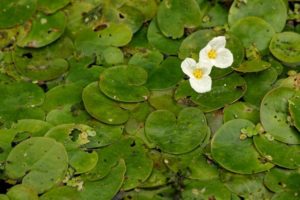
September’s News to Us highlights new policy being put in place to protect Michigan’s drinking and recreating water from PFAS, what is being done to address the Ann Arbor dioxane plume, beach closings, the aquatic invasive plant species European Frog-bit, and the work being done thanks to the Michigan Natural Resources Trust Fund.
Issues of the environment: Michigan’s new, more stringent PFAS standards in place
In August, Michigan’s new PFAS drinking water standards took effect. David Fair from the Morning Edition speaks with Mara Herman, a health policy specialist at the Ann Arbor based Ecology Center about PFAS and what the standards mean for public water systems. The new standards are among some of the most strict across the nation. Many municipal water suppliers are working to reduce PFAS levels in water below the new standard with quarterly checks to ensure action.
Expert explains cleanup plan for Ann Arbor dioxane plume in 7 new videos
Following the release of a proposed settlement agreement, Dr. Larry Lemke put together seven videos which summarize the proposed consent judgement for the 1,4 dioxane groundwater contamination under parts of Ann Arbor and Scio Township. Lemke has been studying the plume for over 20 years and has served as an expert in the negotiations between Gelman, EGLE and four local intervenors including HRWC. The proposed consent judgement is currently open for public comment. See also HRWC Director, Rebecca Esselman’s blog about the proposed consent judgement from September 14th, 2020.
Michigan beaches closed by pathogens more than 100 times this year
Heavy rainfall has been the downfall for many beaches. Too much water can lead to overwhelmed sewer systems which then bring pathogens to our recreational water areas. In addition, the aging infrastructure of Michigan and a decreased workforce due to COVID-19 have put immense pressure on any mitigation efforts. Some areas of Michigan have been hit harder with upwards of 54,000 gallons of raw sewage being dumped into rivers and bays. See where beaches have been closed in Michigan during 2020 here.
Invasive species update: European frog-bit in mid-Michigan
European frog-bit is an invasive aquatic plant that has been found in two new locations in mid-Michigan by the Michigan Department of Environment, Great Lakes, and Energy (EGLE). The Department of Natural Resources has asked local leaders, including environmental organizations, to speak up and educate the public about this invasive species. European frog-bit looks like miniature water lilies but can alter water ecosystems drastically and easily be transferred between water bodies. Learn more about what is being done and what you can do to help here.
Preserving Michigan: How Michigan turned $1 billion in oil and gas revenue into conservation with the Michigan Natural Resources Trust Fund
“Preserving Michigan” is a series underwritten by the Michigan Environmental Council of stories which highlight all that the Natural Resources Trust Fund has been able to accomplish. The Natural Resources Trust Fund works by funneling lease and royalty payments from oil, gas and minerals into acquiring, developing and maintaining public recreational lands. The Fund has brought $1.2 billion dollars and counting to the natural landscape of Michigan including $1.28 million to the Huron in 2020 alone. Some of these projects include new bike paths and trails across the state, park expansions, land preservation, and more. A renewal of this fund is on the November ballot as Proposal 1. HRWC supports this ballot proposal.



